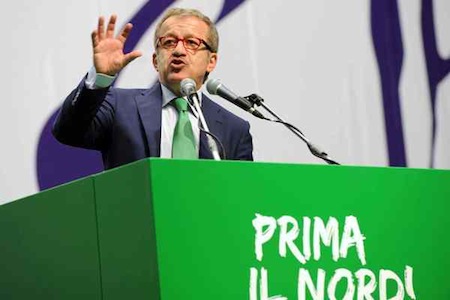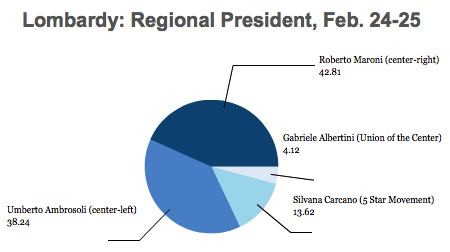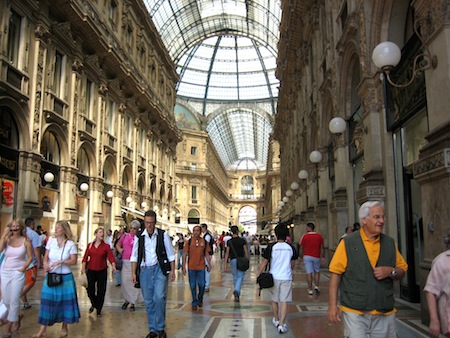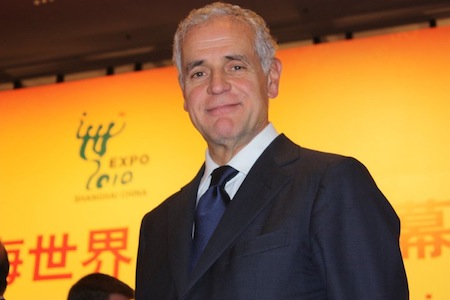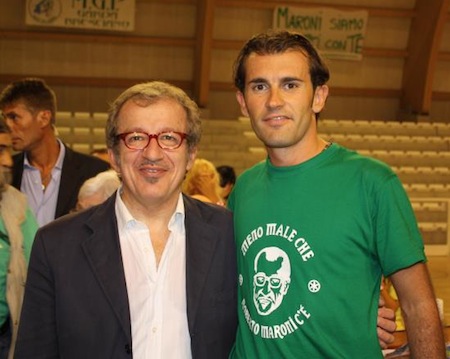European and global stock markets whipsawed earlier this week as investors contemplated the notion of gridlock in Italy’s hung parliament following the weekend’s inconclusive vote, and what that means for the eurozone’s future.
![]()
![]()
Predictably enough, European leaders took turns to warn Italy not to veer from its austerity-minded course, and Germany’s hapless social democratic leader Peer Steinbrück even managed to insult Italy’s president by referring to center-right leader Silvio Berlusconi and protest leader and blogger Beppe Grillo ‘clowns.’
But as Italians turned to counting results from regional elections yesterday, there’s another threat looming on the horizon — the specter of separatism.
Even as the autonomist Lega Nord (Northern League) fell from 60 deputies to just 18 in Italy’s lower house, the Camera dei Deputati (House of Deputies), its leader Roberto Maroni (pictured above) won a hard-fought battle for control of Italy’s largest regional government on a slogan of ‘prima il Nord‘ — ‘the North first.’
That’s because, in addition to the general election, Italians in Lombardy, Lazio and Molise also went to the polls to elect their regional governments as well — it’s as if, on the day of the Canadian federal election, each of Ontario, British Columbia and Prince Edward Island each held their own provincial elections as well.
And there’s no bigger prize than Lombardy, the home of Milan, Italy’s financial, industrial and fashion capital, is Italy’s wealthiest region and its most populous as well — with 10 million people, one in six Italians is a Lombardian.
Maroni’s victory is pivotal because it now gives the Northern League control of the regional governments in Italy’s three largest, wealthiest regions, and Maroni has not hidden his ambitions for a more autonomous northern Italy. In the past two decades, the Northern League has alternated between supporting greater autonomy and supporting full independence for ‘Pavania,’ its term for northern Italy.
Maroni envisions a Europe of ‘regions,’ and a more federal Italian government that allows northern Italy to keep more of its revenues:
“If I win in Lombardy, a new phase will open: it’s about the path which leads to the creation of the macro-region, and in the same time the first piece of the new Europe of the Regions. It’s an ambitious project, which is not concerning the destiny of Lombardy only, but of the entire North. And it could change history: in Italy’s Northern regions and in Europe.”
That explains, in part, why Maroni was so enthusiastic to leave national politics for local politics — he took over as national leader only last year after long-time Northern League leader Umberto Bossi resigned amid corruption charges. Maroni has become a familiar face to all Italians over the past two decades — he served as minister of the interior in Berlusconi’s past 1994-95 and 2008-11 governments, and as minister of labor and welfare from 2001-06.
Initially, Maroni wants Lombardy to keep 75% of its total tax revenues, compared to around 66% of the tax revenues it retains currently.
Luca Zaia, the leader of the Liga Veneta (Venetian League), is the regional president of Veneto, where separatist support is strongest, having won the 2010 regional elections in Veneto in a landslide victory, heading a broad center-right coalition.
To the west of Lombardy, in Piedmont, support for the Northern League has traditionally been less enthusiastic — after all, the genesis of Italian unification in the 1860s was born in what was then the kingdom of Piedmont. Nonetheless, Roberto Cota won control of Piedmont’s government in the 2010 regional elections, leading a center-right coalition that very narrowly ousted the previous center-left Piedmontese government.
With a 2014 referendum on Scotland’s independence from the United Kingdom scheduled and an inevitable showdown between Catalunya’s president Artur Mas and the federal Spanish government over Catalan independence, Maroni’s consolidation of northern Italy under autonomist control means that northern Italy may become the next separatist domino to follow, especially as Italy’s economy continues through a brutal recession and its national government seems unable to take any measures to ameliorate economic decline (or, following this weekend’s election, take any measures at all).
So long after the current crisis recedes with respect to Italy’s national government, Maroni will be around for some time to come to cause headaches for the next Italian prime minister — even more so if it turns out to be a center-left prime minister, such as Pier Luigi Bersani, whose centrosinistra coalition, dominated by Bersani’s Partito Democratico (PD, Democratic Party), looks to form a stable government.
In some ways, Maroni’s victory is more stunning than the Northern League’s 2010 upset victory in Piedmont. Continue reading Maroni’s Lombardy victory consolidates Northern League’s regional hold
